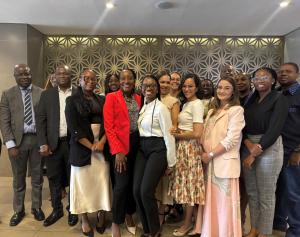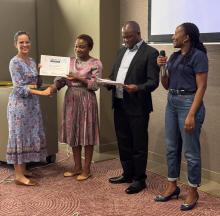Ensuring Quality Health Products for Namibia's Market
The Namibia Medicines Regulatory Council (NMRC) with support from the World Health Organization (WHO), conducted an intensive training workshop on dossier assessment in Windhoek from 2 to 13 December 2024. The program equipping participants with comprehensive skills in dossier evaluation for pharmaceutical products. The twenty-two participants included assessors, inspectors, pharmacovigilance pharmacist and analysts from the Namibia Medicines Council Secretariat, a laboratory technologist and lecturer from the School of Pharmacy at the University of Namibia, and a WHO Country Office staff.
In his opening remarks at the workshop, Dr. Richard Banda, WHO Representative in Namibia, emphasized the WHO’s commitment to strengthening regulatory systems to ensure equitable access to quality health products. He highlighted the importance of National Medicines Regulatory Agencies in ensuring that health products are safe, effective, and of assured quality, protecting populations from substandard and falsified medicines.
Mr. Johannes Gaeseb, Director of Tertiary Healthcare and Clinical Support Services at the Ministry of Health and Social Services, reinforced the critical role of medicines regulation in public health. He highlighted that maintaining high standards of quality, safety, and efficacy is not just a technical function of the Namibia Medicines Regulatory Council, however, a key component of safeguarding public health. The remarks underscored the vital role of rigorous dossier assessment in assuring the safety, efficacy, and quality of medicines, ensuring public confidence, and promoting better treatment outcomes in Namibia.
The training covered both basic and intermediate principles of dossier assessment, including quality principles, good report writing, pharmaceutical development, and active pharmaceutical ingredient reviews. Advanced topics such as analytical procedures, stability data evaluation, and bioequivalence study assessments were also addressed. Special emphasis was placed on reviewing product information, labelling, and bioanalytical validation reports. Facilitators incorporated practical exercises and case studies to simulate real-world dossier reviews, enabling participants to refine their understanding of regulatory expectations and apply theoretical knowledge to actionable skills effectively.
The training fostered a robust understanding of international regulatory standards and dossier evaluation methods. Participants gained confidence in addressing complex issues, such as genotoxic impurities, nitrosamine contamination, and biowaiver applications. Participants demonstrated improved competence through post-training evaluations and practical exercises. On the final day of the two-week workshop, all participants were awarded certificates by the Registrar of Medicines, Ms. Fransina Nambahu, upon successful completion.
This workshop represents a significant step toward strengthening Namibia’s regulatory system. By equipping assessors with advanced skills and fostering a culture of accountability, the NMRC is better positioned to safeguard public health by ensuring availability of quality, safe and efficacious health products in the market.




